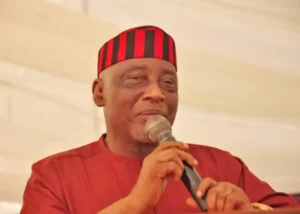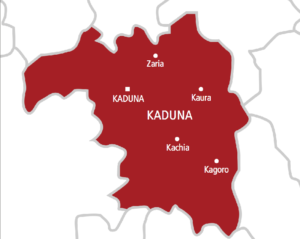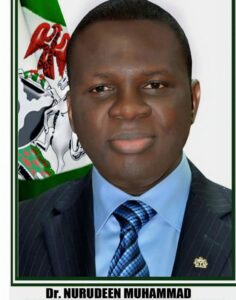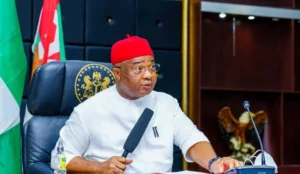As Nigeria looks ahead to the 2027 general elections, the political landscape is already being analyzed by experts and political figures. One such figure, Maxi Okwu, former national chairman of the All Progressives Grand Alliance (APGA), believes that President Bola Tinubu’s re-election is practically a done deal. In an interview, Okwu expressed serious doubts about the ability of the current electoral system to ensure free and fair elections, claiming that Tinubu’s political strategy and influence make it very hard for anyone to challenge him successfully.
Okwu’s major argument is rooted in his criticism of Nigeria’s electoral management body, the Independent National Electoral Commission (INEC). According to Okwu, the failures of INEC are undermining Nigeria’s democracy and making it easier for politicians like Tinubu to secure power without much opposition. He explained that the introduction of electronic voting systems like the Bimodal Voter Accreditation System (BVAS) and the INEC Result Viewing Portal (IREV) was meant to improve transparency. However, he said these improvements have been sabotaged by human interference.
Okwu agreed with former President Goodluck Jonathan’s observation that technology alone cannot solve electoral problems if the people behind the system are corrupt. He pointed out that, despite the use of electronic voting systems, election results are still manually calculated in back rooms, which opens the door to manipulation and fraud.
He compared Nigeria’s election process with that of the United States, where results from counties are quickly calculated and projected by media outlets. Okwu criticized the long delays and manual computations in Nigeria, describing it as a regression to old and inefficient methods. “We are moving backward when it comes to elections,” he remarked. He believes this flawed system plays directly into the hands of a savvy politician like Tinubu, who knows how to navigate such environments to his advantage.
Maxi Okwu also touched on the political dynamics in Anambra State, particularly regarding Governor Chukwuma Soludo’s position in the All Progressives Grand Alliance (APGA). According to Okwu, Soludo has distanced himself from the party and might have to consider joining the All Progressives Congress (APC) if he wants to maintain his political career. Okwu suggested that unless Soludo reconciles with key APGA leaders like Edozien Njoku and Chekwas Okorie, his future in APGA seems uncertain.
Okwu also hinted at the possibility of the APC taking over Anambra in future elections, aligning with recent comments from APC national chairman, Abdullahi Ganduje, who indicated that the party would aim to capture Anambra in 2025. For Okwu, this further supports his belief that APC’s political influence will continue to grow, solidifying their hold on power across different regions.
A significant part of Okwu’s interview focused on his disappointment with the state of human rights under Tinubu’s administration. He expressed shock that Tinubu, who once stood as a defender of democracy, is now overseeing a government accused of human rights violations. Okwu cited several concerning incidents, such as the arrest of Nigeria Labour Congress (NLC) president Joe Ajaero, the police raid on the office of the Socio-Economic Rights and Accountability Project (SERAP), and the arrest of activist Omoyele Sowore.
For Okwu, these incidents are a troubling sign of how the government is handling dissent and civil rights. He lamented that the very issues Tinubu fought against in the past are now happening under his leadership. “It’s surprising and frustrating,” Okwu said, emphasizing that Tinubu, as the Commander-in-Chief, cannot escape responsibility for these actions.
He also noted how public protests against government actions have diminished over time. Comparing the present situation to the massive protests in 2014 when former President Goodluck Jonathan attempted to remove the fuel subsidy, Okwu pointed out how much has changed. Now, even with the cost of petrol skyrocketing, the public remains largely silent, which Okwu believes shows that people have become disillusioned and cowed by the system.
Okwu also addressed the alarming rise in suicide rates in Nigeria, blaming it on the government’s failure to provide for its citizens. He criticized the government for neglecting its constitutional responsibility to ensure the welfare and security of Nigerians, as outlined in Section 14(2b) of the Constitution.
With inflation soaring and the cost of living increasing, Okwu believes that many Nigerians are being pushed to their limits. He described the current economic situation as worse than the chaos of Idi Amin’s Uganda, with the Naira losing value and the price of basic goods becoming unaffordable for the average citizen. According to Okwu, the government’s failure to improve the economy or provide adequate security is driving people to despair, resulting in a spike in suicides.
Okwu did not hold back when discussing the internal struggles of the Peoples Democratic Party (PDP), particularly the influence of Nyesom Wike, the Minister of the Federal Capital Territory (FCT). Okwu described Wike as a “rogue element” within the PDP, criticizing the party for allowing Wike to hold sway despite his disruptive behavior. Wike has been known for making bold statements, including a recent threat to deal with any PDP governor who interferes with his control over Rivers State.
Okwu expressed disappointment in the PDP’s inability to act as a strong opposition to the APC. He said that the PDP has failed to challenge the ruling party and has instead allowed itself to be manipulated. Wike’s actions, in Okwu’s opinion, reflect a broader issue of political inconsistency and a lack of strategic direction within the PDP. He also expressed concerns about the PDP’s failure to check APC dominance, which has contributed to the party’s weakening influence.
In Okwu’s view, the 2027 elections are already tilting heavily in favor of President Tinubu. The combination of INEC’s weaknesses, Tinubu’s political expertise, and the lack of a strong opposition makes it hard to imagine a different outcome. Okwu believes that without major reforms to Nigeria’s electoral process, any hope for a transparent election in 2027 remains slim.
Okwu’s reflections are a sobering reminder of the challenges Nigeria faces in its political and electoral systems. As the country prepares for another election cycle, the need for transparency, fairness, and true representation of the people’s will is more crucial than ever.







